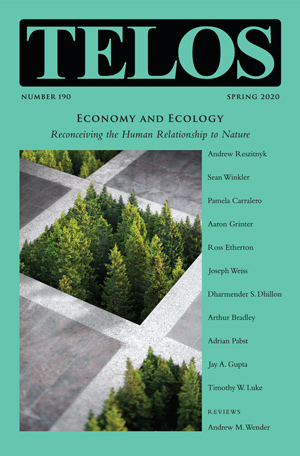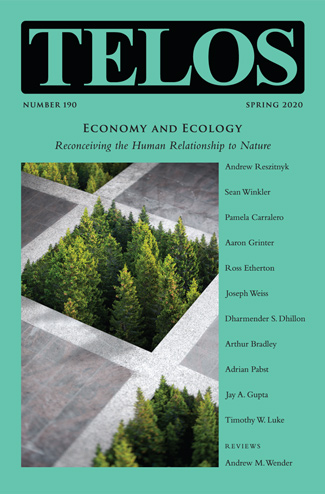Pamela Carralero’s “Scientific Modeling and the Environment: Toward the Establishment of Michel Serres’s Natural Contract” appears in Telos 190 (Spring 2020): Economy and Ecology: Reconceiving the Human Relationship to Nature. Read the full article at the Telos Online website, or purchase a print copy of the issue in our online store. Individual subscriptions to Telos are available in both print and online formats.
 In the sciences, the hypotheses driving the exploration of the natural world are often investigated via analogical transfer, meaning that the crux of scientific activity resides in the use and interpretation of models as tools that facilitate an accurate description of natural laws. The exact status of the model’s role and its lasting importance, however, remains a controversial topic among scientists and philosophers. For some, the model is a way of reaching a conclusive theorem or systematic statement; for others, including French philosopher Michel Serres, the model is a multifaceted space of translation that asks its interpreters to meditate on the inaccessible nature of what it makes accessible via ideogrammatic transcription.
In the sciences, the hypotheses driving the exploration of the natural world are often investigated via analogical transfer, meaning that the crux of scientific activity resides in the use and interpretation of models as tools that facilitate an accurate description of natural laws. The exact status of the model’s role and its lasting importance, however, remains a controversial topic among scientists and philosophers. For some, the model is a way of reaching a conclusive theorem or systematic statement; for others, including French philosopher Michel Serres, the model is a multifaceted space of translation that asks its interpreters to meditate on the inaccessible nature of what it makes accessible via ideogrammatic transcription.
Placing Serres in conversation with Bruno Latour and Jacques Rancière, this article argues that Serres provides the tools to theorize models as mediums through which to acknowledge and interact with the environment as that which is innately inaccessible to human knowledge. This is a first step toward establishing what he calls a “natural contract,” a union of life-giving reciprocity between humans and nonhumans that offers new conceptualizations of knowledge and science as practices free from the totalizing codifications of human verdicts. More specifically, this article imagines models as gateways between the inaccessible and accessible, arguing their value as a setting for the construction and play of scientific interpretations. It concludes by examining the relationship between modern climate models and the inaccessible in order to propose a techno-scientific, intra-temporal mentality of uncertainty from which a natural contract can develop.








